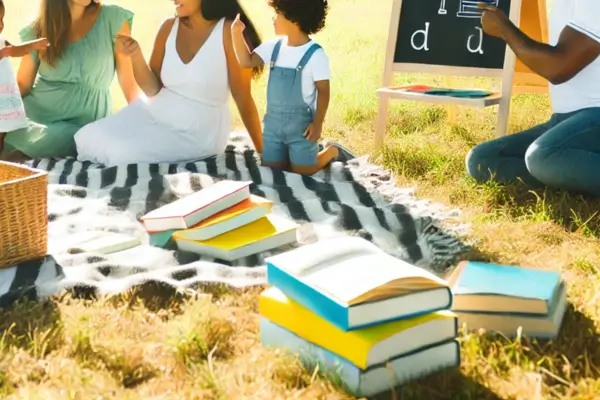Learning Portuguese as a family is more than just picking up a new language – it’s about building a deeper connection with your new life in Portugal. As expatriates, navigating daily life in a foreign language can feel overwhelming, but it’s also an opportunity to create a strong foundation for your family in a new culture. Mastering Portuguese together not only helps you communicate but also opens doors to a richer, more integrated experience.
When the whole family learns together, it strengthens bonds and makes settling into a new home much easier. Whether you’re shopping for a new house or getting to know the neighbors, speaking the local language creates a sense of belonging. It can also ease the challenges of raising children in a foreign country, giving them the tools they need to thrive.
Understanding the Challenges of Learning a New Language in Portugal
Learning Portuguese as a family in Portugal comes with its own set of challenges, but understanding these obstacles is the first step toward overcoming them. Whether you’re settling into a small town or a bustling city, the language barrier can make even the simplest tasks feel daunting. However, by acknowledging these challenges upfront, you can approach them with the mindset of turning them into opportunities for growth, both individually and as a family.
Language Barriers: Feeling Lost in Translation
One of the biggest hurdles for expatriates is simply understanding and being understood. Even though many Portuguese people speak English, relying on it too much can hinder your ability to truly integrate. For your family, this can lead to feelings of isolation—especially when interacting with locals who may not speak much English. Children, in particular, might struggle more at school or while making new friends. Overcoming this starts with patience and practice, but it might be easier on them than on you..
The good news is that Portuguese is a phonetic language, so once you learn the basics, pronunciation gets easier. With consistent effort, the language will start to feel more familiar, and your confidence in speaking it will grow. As a family, you can support each other by encouraging small, everyday conversations in Portuguese, from ordering food at a restaurant to asking for directions on a walk. These moments will gradually build your understanding and confidence.
Different Learning Speeds: Not Everyone Progresses at the Same Pace
In a family, each member will likely learn at their own pace. Adults may feel the pressure to master the language quickly, while children might pick up vocabulary faster but struggle with grammar. Teenagers may feel frustrated with the slower progress of their parents, and younger kids might only grasp basic words but have fun with them. The key here is to avoid comparing progress between family members.
Instead, celebrate individual milestones. Adults can focus on practical phrases and functional language skills for daily tasks, while kids can enjoy language games or apps designed for their age group. Working together as a family, you can create a supportive environment where each member’s progress is celebrated. Emphasizing teamwork and celebrating small wins—whether it’s your child using a new word or an adult mastering a tricky phrase—will keep everyone motivated.
Cultural Differences: Beyond the Language Itself
Learning a new language isn’t just about words; it’s also about understanding the culture that comes with it. In Portugal, social norms and behaviors can be quite different from what you’re used to. From greetings to table manners to the pace of life, there’s a lot to take in. This can be overwhelming for families, especially when trying to navigate social situations while still learning the language.
However, these cultural differences are an opportunity to connect with the local community in meaningful ways. By embracing these new customs and incorporating them into your daily life, your family can build stronger ties to Portugal. Whether it’s learning how to greet people with a kiss on the cheek or understanding the Portuguese appreciation for leisurely meals, cultural immersion becomes an extension of language learning. The more your family embraces these cultural shifts, the more comfortable and integrated you will feel.
These challenges are all part of the journey, and facing them as a family can help you grow closer while adapting to your new life in Portugal. By taking a patient, supportive approach to language learning, your family will turn these obstacles into stepping stones for success.
Creating a Family-Friendly Learning Environment
Creating the right environment for language learning at home can make a huge difference in how quickly your family picks up Portuguese. It’s not just about memorizing vocabulary; it’s about setting up a space where learning feels natural, engaging, and fun for everyone. By integrating Portuguese into your daily routines and creating a supportive atmosphere, you’ll encourage progress without it feeling like a chore.
Setting Up a Language-Friendly Space at Home
The physical environment plays a key role in language learning. Start by infusing your home with Portuguese in small but meaningful ways. Label common items in your house (e.g., “porta” for door, “janela” for window, “cadeira” for chair) with simple post-it notes. This helps all family members, especially younger kids, associate the objects with their Portuguese names. You can also put up inspirational quotes or signs in Portuguese to keep the language in view and make it part of the daily atmosphere.
Another effective tool is digital resources. Make use of language learning apps like Duolingo or Memrise, which can be used by everyone in the family. These apps turn learning into a game, making it more enjoyable and interactive for kids and adults alike. Set up a dedicated family learning area where everyone can gather to watch Portuguese-language videos, play language games, or do interactive exercises together. This helps reinforce the idea that learning is something you do as a family, not just as individuals.
Integrating Portuguese into Daily Routines
One of the most effective ways to learn is through immersion, and there’s no better way to immerse yourself in Portuguese than by using it in daily activities. Try integrating the language into your family’s routines, even in simple tasks. For example, when you cook together, use Portuguese terms for ingredients, utensils, and actions (e.g., “faca” for knife, “mexer” for stir). This not only helps with vocabulary but also connects words to real-life experiences.
Shopping is another great opportunity for language practice. Make a shopping list in Portuguese and encourage everyone to try reading the items out loud as you go through the store. This helps you get comfortable with everyday vocabulary in a natural setting. Additionally, during playtime, incorporate Portuguese games or stories. There are plenty of apps and YouTube channels that feature games or songs in Portuguese, turning learning into a fun family activity rather than a task.
Encouraging a Positive Attitude Towards Learning
One of the most important aspects of language learning is maintaining a positive attitude, and this starts with the family dynamics. Celebrate every small victory, whether it’s using a new phrase or understanding a conversation. Discuss language learning regularly as a family, setting aside time to talk about new words or experiences. This creates a supportive environment where everyone feels motivated to continue.
Setting realistic goals is also key. For example, you might aim to have a 10-minute conversation in Portuguese by the end of the week, or to learn five new words every day. These small goals keep learning manageable and provide a sense of accomplishment. Remember, the focus should be on progress, not perfection. Encourage your family to practice without the fear of making mistakes, because mistakes are part of the learning process.
By turning your home into a language-friendly environment, making Portuguese a natural part of your daily life, and fostering a positive, goal-oriented attitude, you’ll help your family stay motivated and engaged in the language-learning process. This approach not only speeds up the learning but also makes it a fun, enriching experience that strengthens your family’s bond.
Fun and Engaging Activities for Learning Portuguese as a Family
Learning Portuguese doesn’t have to be a boring, textbook-only experience. In fact, the more fun and interactive the activities, the quicker your family will pick up the language. By turning learning into play, everyone—from young kids to adults—can stay motivated and engaged. Here are some fun and effective ways to make Portuguese learning enjoyable for the whole family.
Language Games and Activities for All Ages
Games are a fantastic way to make language learning feel like a fun family event rather than a chore. There are plenty of language-focused board games and activities that make practicing Portuguese enjoyable for all ages.
- Language board games: Games like “Scrabble” or “Boggle” can be adapted to Portuguese, helping everyone build vocabulary in a competitive but friendly way. You can also try specific language games designed for learning, such as “Batalha Naval” (Portuguese Battleship) or “Jogo da Memória” (Memory Game) with Portuguese words and phrases.
- Role-playing: Pretend play is great for kids, but adults can benefit from it too. Set up a “mini-market” in your living room, where family members take turns being the shopkeeper and the customer. Use Portuguese to “buy” and “sell” items, or practice common phrases you’d use at a store or restaurant.
- Scavenger hunts: A scavenger hunt in Portuguese is not only fun, but it also helps family members learn to follow directions and practice vocabulary in a hands-on way. You can create clues in Portuguese for everyone to solve, leading them to hidden objects or tasks around the house or yard.
These activities make learning dynamic and create a sense of accomplishment for every family member as they use the language in practical situations.
Using Multimedia to Practice Listening and Comprehension
Listening and comprehension are just as important as speaking when learning a new language, and multimedia can be an excellent way to develop these skills. The good news is that there are countless Portuguese-language options available for all ages.
- Children’s shows and cartoons: For younger kids, there are many entertaining and educational shows in Portuguese. Programs like “Dora the Explorer” (in Portuguese, “Dora, a Aventureira”) or “Peppa Pig” offer simple dialogue and are perfect for beginners. Watching these shows not only teaches basic vocabulary but also helps children get used to the natural rhythm and pronunciation of Portuguese.
- Portuguese music and songs: Music is a powerful tool for language learning. Listening to Portuguese songs—whether traditional fado music or contemporary pop—can expose the family to new words and phrases. Singing along to catchy tunes also helps with pronunciation and memory. You can even make a family playlist of your favorite Portuguese songs and turn car rides into listening sessions.
- Audiobooks: For older children and adults, Portuguese audiobooks are a great way to improve listening comprehension. You can listen to stories while on walks or during family downtime, allowing you to practice the language without needing to be fully focused on it. Choose books at various levels of difficulty to match your family’s skills.
Apps, Interactive Tools, and Websites for Fun Practice
There are also plenty of modern tools and apps designed to make language learning interactive and enjoyable for everyone. These digital resources offer fun, gamified experiences that turn practice into play.
- Duolingo: This app is perfect for families looking for an easy, game-like approach to learning. You can set up separate accounts for each family member, where everyone progresses at their own pace. Duolingo’s interactive lessons and short exercises are ideal for practicing new vocabulary and grammar in a fun way.
- Babbel: Babbel offers family-friendly lessons that focus on practical phrases for daily life. With exercises designed to reinforce vocabulary and grammar, Babbel provides an excellent balance of speaking, listening, and writing practice, all while being enjoyable and straightforward.
- Memrise: This app uses video clips of native speakers to help with pronunciation and comprehension. The interactive lessons make learning feel like a series of challenges, which can keep the whole family engaged. It’s a great tool for beginners and intermediate learners alike.
- YouTube Channels: Channels like “Learn Portuguese with PortuguesePod101” and “Portuguese with Carla” provide excellent free resources with lessons for beginners, including vocabulary, grammar, and cultural tips. These channels are a great way to learn at your own pace, and the videos often feature interactive exercises for the whole family to do together.
Integrating these activities into your family’s routine will not only make learning Portuguese more enjoyable but will also help everyone progress at their own pace. The key is to keep it light, fun, and interactive so that language learning becomes an exciting part of your family’s daily life. Whether through games, music, or digital tools, there are endless ways to make Portuguese practice a rewarding experience for everyone.
Incorporating Portuguese into Everyday Family Life
One of the most effective ways to learn Portuguese as a family is by integrating it into your daily routine. The more you use the language in everyday situations, the more natural it will feel. Whether you’re out running errands, cooking at home, or simply having conversations during family walks, there are endless opportunities to practice Portuguese without it feeling like a structured lesson.
Practical Ways to Practice Portuguese in Daily Situations
Incorporating Portuguese into daily activities not only strengthens your vocabulary but also makes learning part of the rhythm of life. Start with simple tasks and phrases, and build from there.
- Grocery shopping in Portuguese: When you head to the market, practice identifying items in Portuguese. Make a shopping list with Portuguese words (e.g., “tomate” for tomato, “leite” for milk, “pão” for bread), and encourage everyone to read the labels in the store. You can even turn it into a fun game by challenging family members to guess what an item is in Portuguese before checking the label. This is an easy way to familiarize yourself with everyday food-related vocabulary.
- Using Portuguese in the kitchen: Cooking is another great opportunity to practice language. Read out the names of ingredients in Portuguese, give cooking instructions using simple phrases (“corte” for cut, “misture” for mix), and even try playing Portuguese cooking videos or recipe tutorials together. This helps associate Portuguese with actions and objects, making the language more tangible.
- Practicing numbers and colors: Numbers and colors are essential building blocks in any language, and they’re easy to practice in real life. Count items around the house or when out on a walk (“um, dois, três” for one, two, three), and identify colors (“azul” for blue, “verde” for green) on objects you see. This can be done spontaneously throughout the day, helping both kids and adults feel more comfortable using Portuguese in everyday situations.
Emphasizing Small Moments for Language Practice
While structured learning is important, it’s the small moments throughout the day that can have the greatest impact on language retention. These moments may seem insignificant, but they are powerful opportunities to practice.
- Chatting during walks: During family walks or car rides, switch to Portuguese for casual conversations. Discuss what you see, ask questions in Portuguese, or simply talk about your day. These informal chats help you reinforce vocabulary and improve sentence structure in a relaxed, no-pressure environment.
- Playing with local children: If your kids are interacting with Portuguese-speaking children, encourage them to use the language. Whether at the park, in a playgroup, or through neighborhood friendships, these interactions are invaluable for learning. Playing with local kids is a natural way for your children to pick up phrases and slang that may not appear in textbooks.
- Learning Portuguese phrases for everyday situations: Take advantage of situations like going to a café or post office to practice relevant phrases. Teach your children how to say “Por favor” (please), “Obrigado” (thank you), or “Quanto custa?” (How much does it cost?). These everyday interactions help everyone feel more confident and capable in the community.
Encouraging Children to Use Portuguese with Local Friends
Encouraging your children to interact with local Portuguese-speaking peers is one of the most effective ways for them to accelerate their language skills. Socializing with local children helps them pick up conversational Portuguese quickly, especially the informal, everyday language that’s often missing from textbooks.
- Foster local friendships: Encourage your children to play and spend time with local kids. Whether it’s joining sports teams, extracurricular activities, or simply hanging out at the playground, these interactions are full of opportunities to learn. Portuguese kids are often very patient and eager to help non-Portuguese speakers, making it a great way for your children to practice in a comfortable, peer-supported environment.
- Participating in community events: Portugal has many community events and festivals that are great for language immersion. Whether it’s a local market, festival, or family-friendly event, participating will expose your family to the language in a real-world context. Try to get involved in these activities regularly, as they offer chances to learn culturally-specific phrases and expressions while also connecting with the community.
By weaving Portuguese into your family’s daily life—whether through grocery shopping, cooking, or casual conversations—you create constant opportunities to practice. Over time, these small moments add up to significant progress. Not only will everyone in your family get more comfortable using Portuguese, but you’ll also feel more connected to your new life in Portugal.
Finding Local Resources and Community for Support
Learning Portuguese as a family is not something you need to do alone. One of the best ways to accelerate your progress and feel more connected to your new home is by tapping into local resources and becoming an active part of the community. Whether through language classes, playgroups, or participating in cultural events, there are many opportunities in Portugal that will help you practice Portuguese in real-life settings, all while making your family’s experience more enjoyable and enriching.
Making the Most of Local Language Classes and Playgroups
Local language classes tailored to families can be incredibly helpful, especially if you’re looking for structured learning that’s both practical and fun. Many cities and towns across Portugal offer language classes designed for expatriates, and some even have specific programs for families. These classes focus on everyday situations and practical language use, making them a great way to learn vocabulary and phrases you can immediately apply.
- Family-friendly language classes: Look for classes that welcome children, as these often incorporate games, songs, and interactive lessons that engage both adults and kids. In many cases, you’ll find that these classes focus on teaching basic language skills in an engaging, age-appropriate way, which is perfect for young learners.
- Playgroups and parent meetups: Playgroups are an excellent way for children to interact with local kids while you connect with other expatriates or local parents. Many community centers, libraries, or schools host playgroups where children can practice Portuguese through songs, games, and stories, while parents can chat and exchange tips on adapting to life in Portugal. These gatherings are often informal and provide both language learning and social support.
Encouraging Involvement in Local Culture
One of the best ways to learn Portuguese is through cultural immersion. By actively participating in local cultural events, your family can practice the language in a fun and relaxed environment, while also learning about Portuguese traditions and customs. Engaging with the local culture will make the language feel more relevant and connected to your daily experiences.
- Food and cooking: Portugal is known for its rich culinary traditions, and food is a wonderful way to get a feel for the language. Visiting local markets and cooking traditional dishes together as a family allows you to learn food-related vocabulary while experiencing Portugal’s gastronomic delights. You might also try attending cooking classes in Portuguese, where you can learn how to prepare traditional Portuguese dishes while practicing the language with locals.
- Festivals and outdoor activities: Participating in local festivals, such as the famous Festa de São João in Porto or the Feira de Março in Aveiro, can immerse your family in the culture and language. Festivals often include local music, dances, and plenty of opportunities to meet Portuguese speakers. Similarly, outdoor activities like hiking, beach outings, or visiting historical sites can provide informal settings for practicing Portuguese with locals while enjoying the beauty of Portugal.
Working with Local Tutors or Language Exchange Programs
To make the language learning process more personalized, working with a local tutor or participating in a language exchange program can be a game-changer. Tutors can tailor lessons to your family’s specific needs, whether it’s focusing on conversational skills, grammar, or cultural nuances. Plus, they can provide immediate feedback, which is often difficult to get in group settings.
- Local tutors: Many tutors in Portugal offer lessons for families, and some even specialize in helping expatriates adjust to the language and culture. Working with a tutor one-on-one or in small groups can allow your family to progress at your own pace, addressing any areas where you may need extra help. A tutor can also recommend helpful resources and suggest learning strategies that suit your family’s individual learning styles.
- Language exchange programs: Another fantastic way to learn Portuguese is through language exchange programs. Many communities in Portugal have language exchange groups where you can practice Portuguese with locals who want to learn your native language. These informal sessions not only help you improve your speaking and listening skills but also give you a chance to meet new people and immerse yourself in authentic Portuguese conversations.
Becoming Part of the Community
Living in Portugal provides a unique opportunity to learn and grow as a family, but becoming an active member of the local community will make that journey even more rewarding. Whether you’re attending a local event, enrolling in a language class, or simply chatting with locals at the market, engaging with the culture will deepen your understanding of the language and help you feel more connected to Portugal.
By finding local resources, participating in cultural activities, and working with tutors or language exchange programs, you can ensure that the entire family’s language-learning experience is both effective and enriching. These community connections not only help you practice Portuguese in real-life contexts but also provide a sense of belonging in your new home.
Celebrating Milestones and Progress Together
Language learning is a journey, and like any journey, it’s important to celebrate your progress along the way. Whether it’s mastering a new set of vocabulary, understanding a conversation, or having your first all-Portuguese chat with a neighbor, these milestones are worthy of recognition. Tracking your family’s progress not only helps keep motivation high but also reminds everyone that learning a language is a process, not a race. Celebrating together strengthens your family’s bond and keeps you focused on the positive aspects of your language-learning journey.
Tracking Progress and Setting Milestones
One of the best ways to stay motivated as a family is by setting realistic milestones that everyone can work toward. Whether big or small, achieving these goals gives your family something to look forward to and keeps the learning experience feeling fresh and rewarding.
- Setting milestones: Start by defining what success looks like at different stages. For example, you might aim for your family to be able to introduce themselves in Portuguese after a month, order a meal in a restaurant using only Portuguese after two months, or hold a 10-minute conversation with a local after six months. By breaking down larger goals into smaller, achievable steps, it becomes easier to track progress and stay motivated.
- Family language journal: Keep a family language journal to track milestones and reflect on your progress. This can be a simple notebook where everyone writes down new words or phrases learned each week or records achievements like “today we had our first conversation in Portuguese at the grocery store.” It’s a tangible way to see how much your family has grown in their language skills. Plus, it’s fun to look back and reminisce on how far you’ve come.
Celebrating Small Victories
Language learning isn’t just about reaching the big milestones—it’s about appreciating the small victories along the way. Even if it’s something as simple as pronouncing a word correctly for the first time or understanding a phrase in a local TV show, these moments should be celebrated.
- Rewards: Celebrate achievements, both big and small, by giving your family small rewards. This could be as simple as treating everyone to a favorite Portuguese snack, enjoying a family movie night in Portuguese, or taking a special outing to a local festival. These rewards not only acknowledge the hard work put into learning but also associate the process with fun and positive experiences.
- Positive reinforcement: Encourage each family member by providing positive feedback. Praise kids for their enthusiasm when they speak Portuguese, and recognize the effort adults are putting into learning the language. Recognizing each other’s contributions helps keep morale high, especially when challenges arise.
Maintaining Consistency and Staying Patient
Consistency is key when it comes to language learning, but it can also be the hardest part. Learning a language is not something that happens overnight, and there will be times when progress feels slow. But it’s crucial to stay patient and remind your family that persistence is what pays off in the long run.
- Long-term consistency: Keep language practice integrated into your daily routine. Whether it’s five minutes of vocabulary practice after dinner, listening to Portuguese music during car rides, or reading a children’s book in Portuguese before bed, consistent small efforts add up over time. Make language learning a natural part of your family life, rather than something that feels like a separate task.
- Staying patient: Remind your family that mistakes are a natural part of the learning process, and encourage a growth mindset. Language learners often feel frustrated when they don’t progress as quickly as they’d like, but celebrating the small victories helps create a more positive and patient attitude. Learning a language is a marathon, not a sprint.
By tracking progress, celebrating milestones, and maintaining patience, your family will stay motivated and excited about learning Portuguese. The key is to stay consistent, appreciate the journey, and recognize that every step forward—no matter how small—is a step closer to mastering the language and feeling more at home in Portugal.
The Family Language Journey: Growing Together in Portugal
Learning Portuguese as a family is not just about acquiring a new language—it’s about deepening your connection with each other and your new life in Portugal. The process of learning together strengthens family bonds, providing shared goals and experiences that create lasting memories. As you work through the challenges and celebrate the victories, you’ll find that the journey of learning Portuguese becomes as enriching as the destination itself.
While it may not always be easy, consistency and patience are the keys to success. Every new word learned, every conversation attempted, and every cultural experience embraced brings your family closer to fluency. Celebrate the small wins, and remember that progress comes with time. The language may seem intimidating at first, but with each step, you’ll feel more confident and connected to Portugal and its people.
Above all, remember that learning Portuguese isn’t just a tool for communication—it’s a gateway to a deeper, more fulfilling experience in your new home. The challenges are part of the process, but so are the joys. By immersing yourselves in the language and culture, you’ll not only enrich your time in Portugal but also build a family experience that is both meaningful and rewarding. Stay patient, stay consistent, and most importantly, enjoy the journey together.




